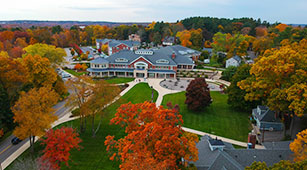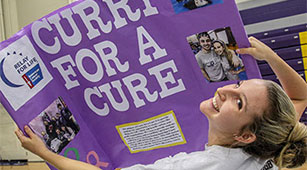Schedule an appointment to meet with the Center for Global and Career Services about your area of interest.
Make an AppointmentHousing Accommodations
Contact Office of Disability Services
- 617-333-2385 (P) 617-333-2990 (F)
- disabilityservices@curry.edu
- Learning Commons, S-104

Accessible Housing is available to students at Curry who have disabilities that substantially impact one or more major life activities as they relate to housing. The purpose of housing accommodations is to address aspects of residential life that are inaccessible in relation to a student’s disability.
Examples of housing accommodations include but are not limited to:
- Elevator or First Floor Access
- ADA Accessible Bedrooms and Bathrooms
- Single Dorms
- Allergen-related modifications such as central air, air conditioning unit and carpet free rooms
- Horn Strobes or Bed Shakers
Any approval under this policy is valid for one academic year, if approved prior to, or during, the fall semester. If the accommodation is approved after the fall semester, the approval is valid for the spring semester only. To receive the same accommodation in each academic year, students must resubmit documentation.
Requesting Housing Accommodations
- Complete the Housing Accommodation Request Form
- Submit your Healthcare Documentation for Housing Accommodations that follows ODS’s guidelines, containing and lists medically necessary housing accommodations specifically. ODS cannot make assumptions based on a diagnosis, or from evaluations/letters that do not include housing needs. Please note that documentation that does not meet the guidelines is considered incomplete, and the housing request will remain incomplete until guideline compliant documentation is received
- After completing the above steps, ODS will reach out to you within 2-3 business days to schedule an appointment.
- Please contact ODS if you do not have or are awaiting documentation to schedule your intake appointment.
- In-person, virtual and phone call appointments are available.
- Appointments are available between 9:00 a.m. - 4:00 p.m., Monday thru Friday.
Once the student completes the above process, their request will be reviewed by ODS to determine eligibility based on medical necessity. Residence Life is often consulted to determine how reasonable accommodations will be implemented based on the specific residential environment. The decision to approve or deny the request will be emailed to the student and will include information on next steps.
Accommodations for Students with Disabilities
- ODS is permitted to approve medically necessary housing accommodations only. Personal preferences, such as a specific residence hall, are not included or permitted in the accommodations process.
- Residence Life reserves the right to place students in a setting that reflects the approved accommodations. Students will not be given multiple options to choose from. Residence Life also reserves the right to reassign a student to a space that meets the medical need. The change will ONLY accommodate the student with the medical need and not the selected roommates.
- An approved housing accommodation will supersede any preferences or roommate selections previously requested.
- ODS and Residence Life are not responsible for helping a student move.
- An approved housing accommodation does not guarantee placement, especially after Residence Life deadlines have passed. Placement is on a first come first served basis, and subject to availability.
Housing Deadlines
Fall deadline for returning students: MARCH 1
Fall deadline for incoming first-year students: JULY 1
Spring deadline for January enrollment: DECEMBER 15
Housing Preferences
Students who may benefit from an adjustment in their residential space due to health related symptoms that do not rise to the level of a significant disabling condition have the opportunity to identify their housing preference(s) during the Curry Housing process. These requests might include specific roommates, AC unit, single room, and suite style living.
Please note that residential buildings and housing units with air conditioning do not guarantee low allergens, better air quality, or consistent air temperatures, because most College residential and academic buildings do not have individually controlled air conditioning units.






